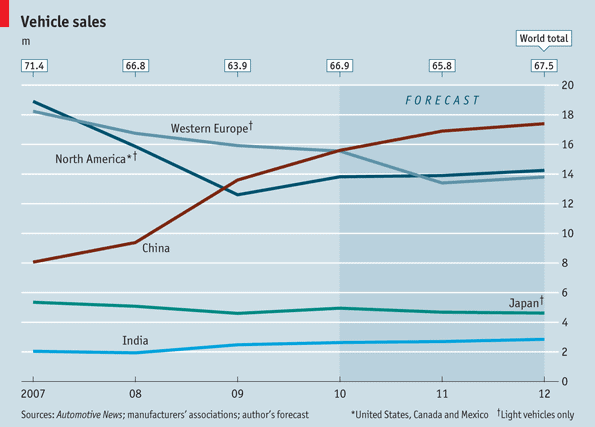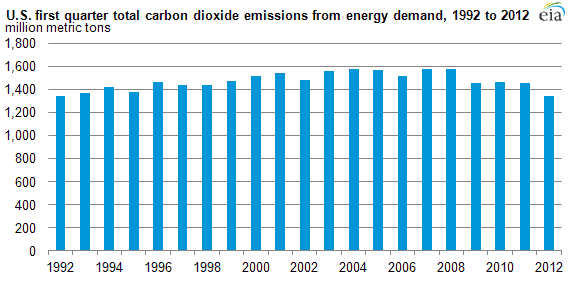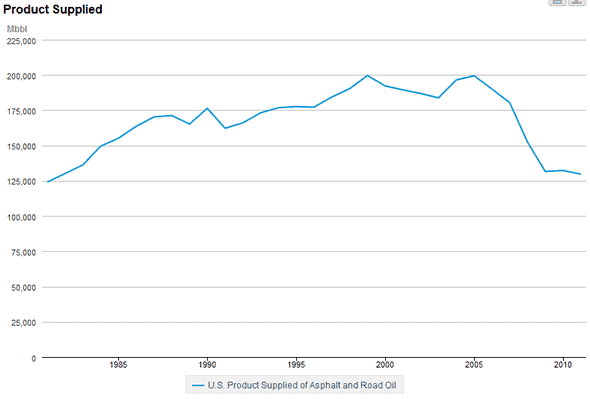India’s recent series of power blackouts, in which 600 million people lost electricity for several days, reminds us of the torrid pace at which populations in the developing world have moved onto the powergrid. Unfortunately, this great transition has been so rapid that infrastructure has mostly been unable to meet demand. India itself has failed to meets its own power capacity addition targets every year since 1951. This has left roughly one quarter of the country’s population without any (legal) access to electricity. That’s 300 million people out of a population of 1.2 billion. Indeed, it is the daily attempt of the underserved to access power that may have led to India’s recent grid crash.
But the story of India’s inadequate infrastructure is only one part of the difficult, global transition away from liquid fossil fuels. Over the past decade, the majority of new energy demand has been met not through global oil, but through growth in electrical power.
Frankly, this should be no surprise. After all, global production of oil started to flatten more than seven years ago, in 2005. And the developing world, which garners headlines for its increased demand for oil, is running mainly on coal-fired electrical power. There is no question that the non-OECD countries are leading the way as liquid-based transport – automobiles and airlines – have entered longterm decline.
Why, therefore, do policy makers in both the developing and developed world continue to invest in automobile infrastructure?
Interestingly, instead of investing in the powergrid, India embarked earlier last decade on a massive highway project, known as the Great Quadrilateral. This created a kind of grand, national circular whose “four and six-lane, 3,625 miles run through 13 states and India's four largest cities: New Delhi, Calcutta, Chennai (formerly Madras), and Mumbai (formerly Bombay),” according to a 2005 New York Times article. The piece continues, describing the ongoing, 15-year effort (to be completed this year) as “the most ambitious infrastructure project since independence in 1947 and the British building of the subcontinent's railway network the century before.”
Alas, the irony is rich. India conceived of this highway project as oil prices hit deep lows at the end of the past millennium. Now that the highway network is constructed and oil prices have more than quadrupled, it is massive investment in the powergrid that hundreds of millions of Indians so desperately need instead—not road building.
Sunk-Cost Decision Making and the Overfocus on Autos
But it’s not just India that has incorrectly invested in automobile transport. The other giant of Asia, China, has also placed large resources into auto-highway infrastructure.
It appears that at least a decade ago, the developing world made the same assumption about future oil prices as was made in Western countries. The now infamous 1999 Economist cover, Drowning in Oil, reflected the pervasive, status-quo view that the global adoption of the car could continue indefinitely. A decade later, however, we find that after oil’s extraordinary price revolution, the global automobile industry is now starved for growth.

In the same way that Western economies have shed enormous tranches of oil demand so that emerging markets could increase their oil consumption, automobile transport is now either stagnating or in outright decline outside of China. You cannot have a growing automobile industry in the United States when American oil demand is down over 12% since 2005. And you cannot have a growing auto industry in Europe when EU oil demand has shed over a million and half barrels a day – another 10% decline.
Europe’s declining oil demand is particularly significant, given that coming into the last decade, the EU was already a highly efficient user of oil. To have taken off even more demand in the past 5 years shows just how tough high oil prices have become in Europe. The result is nothing less than a devastation of Europe’s auto industry, which has already lost 800,000 jobs and looks ready to lose another 500,000 more according to recent forecasts, as reported by Bloomberg. Meanwhile, here is Time Magazine’s big thematic piece from just last month:
Europe’s Debt Crisis Seems Bad? Look at Its Car Industry
Just how bad are things in motoring Europe? On Wednesday Peugeot reported it lost over $993 million in the first half of 2012 alone. The same day, American maker Ford announced second quarter net income of just over $1 billion world-wide — but a $404 million loss in Europe, where the company now expects total losses to exceed $1 billion by year’s end. Meanwhile, General Motors Europe affiliate Opel-Vauxhall has lost a whopping $14 billion since the start of the century, and is almost certainly facing the same sort of layoffs and plant closures Peugeot has announced.....What’s more, the sector is almost certain to see more bad news on the revenue front. According to the Brussels-based European Automobile Manufacturers’ Association (EAMA), new car registration declined by nearly 7% in the first half of the year. All told, projected total sales of 12.4 million cars in 2012 would represent a nearly 20% slide in volume over 2007, when the current string of annual shrinkage began. Forecasts that once saw activity improving by 2013 now push returning health in the sector beyond the recessionary horizon now stretching far off into the European distance....That dismal outlook on the demand side is compounded by concerns over excess supply. Industry analysts say auto manufacturers in Europe maintain around 30% more production capacity than the market will bear.
Captured Governments
Like other dying industries of the past century, the global auto industry has entered decline after having fully embedded itself in the political complex. Regardless of political leaning, federal governments from Europe, to Japan, to the United States have and will continue to do everything possible to save the industry.
US automakers received their first bailout in late 2008 from the Bush Administration. The bailouts continued in the Obama Administration. (Both presidencies that could hardly be more dissimilar, but were united in their assumption of an enduring future for cars). For Republicans -- a party that claims to adhere to free-market principles -- releasing a first payment of over $13 billion to the industry was a classic foxhole-conversion in the midst of the financial crisis. For Democrats -- a party that claims to be concerned with climate change, the environment, and public transport -- the enormous financial support to the industry was only one part of the current administration’s continued embrace of the auto-highway complex.
More broadly, however, global governments are captured by sunk-cost decision making as the past 60-70 years of highway infrastructure investment is now a legacy just too painful to leave behind. Interestingly, whether citizens and governments want to face this reality or not, features of the oil economy are already going away as infrastructure is increasingly stranded. Moreover, there are cultural shifts now coming into play as young people are no longer buying cars – in the first instance because they can’t afford them, and in the second instance because it’s increasingly no longer necessary to own a car to be part of one’s group. See this piece from Atlantic Cities:
Young People Aren't Buying Cars Because They're Buying Smart Phones Instead
Youth culture was once car culture. Teens cruised their Thunderbirds to the local drive-in, Springsteen fantasized about racing down Thunder Road, and Ferris Bueller staged a jailbreak from the 'burbs in a red Ferrari. Cars were Friday night. Cars were Hollywood. Yet these days, they can't even compete with an iPhone - or so car makers, and the people who analyze them for a living, seem to fear. As Bloomberg reported this morning, many in the auto industry "are concerned that financially pressed young people who connect online instead of in person could hold down peak demand by 2 million units each year." In other words, Generation Y may be happy to give up their wheels as long as they have the web. And in the long term, that could mean Americans will buy just 15 million cars and trucks each year, instead of around 17 million.
If future car sales in the US will be limited by the loss of 2 million purchases just from young people alone, then the US can hardly expect to return to even 15 million car and truck sales per year. US sales have only recovered to 14 million. (And that looks very much like the peak for the reflationary 2009-2012 period)
Indeed, the migration from suburbs back to the cities, the resurrection of rail, and the fact that oil will never be cheap again puts economies – and culture – on a newly defined path to other forms of transport and other ways of working.
Cars and the Environment
Recently, the main focus of the global climate change and environment communities has centered on coal-fired power generation. But it's the transport sector that is ripe for changing, given that declining gasoline consumption is already trending favorably in the same direction.
Recent data from EIA Washington shows, unsurprisingly, that US emissions from all energy consumption has fallen back to levels seen twenty years ago.

As CO2 emissions from total US energy demand fell back to levels in the early 1990s, US oil demand has also fallen to levels last seen in that same time period. And thus the official Washington posture towards US oil consumption remains quite conflicted. Washington wants less dependency on foreign oil, lower CO2 emissions, and cheaper gasoline. On the other hand, Washington refuses to meaningfully shift its Transport budget from highways to public transportation.
Ultimately, global governments will be left standing in the way of a process that’s now gaining momentum and is unlikely to be reversed.
Obsolete Infrastructure
For half a century, the auto-highway complex has been a conduit for political power, and myriad players have self-interested reasons to maintain the system. However, the contraction of motorized transport in the West – a natural outcome of high oil prices and debt saturation – will gain further strength as various states (or countries) simply run out of money to build new roads.
As discussed in California: Bellwether for the Rest of America, the highway-rich landscape of the Golden State (for example) sucks up 90% of its transport budget. But California roads are now among the worst in the nation, costing drivers some of the highest on-road expenses merely as a result of poor surface conditions.
To the extent that states can no longer maintain roads to an adequate standard, infrastructure will become stranded.
We see the same related effects in US airport infrastructure as many regional airports have either seen a huge reduction in traffic or have shut down completely. (The US Postal Service and its current financial difficulties also reflect the emerging trend, as the USPS is obligated to deliver mail to remote locations even as postal revenues drop on the higher cost of – you guessed it – energy and gasoline.)
Eventually, drivers will be asked to pay higher tolls and other fees to maintain roads, as public funds, in a time of flat economic growth, are diverted to other services. This will then compound the transition as the costs of maintaining and running a car go even higher. Every car driver is now subsidized. As the subsidy goes away, more drivers will be forced off the road.
Yes, it is painful for both politicians and the public to acknowledge that much of our infrastructure is no longer needed and cannot be redeployed. The public is only now becoming aware that the energy costs of road-building and road-maintenance have gone through the same price revolution as the price of oil. Governments at all levels find that simply keeping the existing roads operable – and not even in particularly good repair – requires enormous annul sums of capital. And, the per-mile construction cost of new roads is prohibitive.
When the national highway system was originally constructed, of course, oil prices were at an inflation-adjusted level of around $12-$14 per barrel. That oil prices now trade at 8 times those levels has completely changed the economic return on road building. Unsurprisingly, the demand for asphalt has crashed back to levels last seen in the early 1980s.

US Product Supplied of Asphalt and Road Oil
End of the Grand Public Subsidy of Roads
The United States has only just begun a long reduction of public spending on roads and highways.
The current administration has shifted only a few percentage points of the transport budget from the auto-highway sector to public transport -- but that shift will grow larger as the years progress.
And while it took many decades for such a shift to develop in the US, the same process will be more rapid in the developing world. In other words, the advance, peak, and decline of motorized transport in China and India will be much more rapid as these nations and their giant populations arrive more quickly to the limits of oil based transport. Indeed, there is already evidence in the data that oil adoption rates have slowed considerably as the majority of new energy demand comes online to the powergrid.
In Part II: The Real Story Is the Rise of the Global Powergrid, we further examine the poor investment prospects of roadbuilding as economies enter the next leg of energy transition. Interestingly, one of the implications of this shift is that oil will be set free to advance to much higher price levels. A paradigmatic shift in global energy usage is underway that has finally become more well-defined, and more visible.
Oil is no longer the new great game; grid power, with its inherent flexibility, is now emerging.
Click here to access Part II of this report (free executive summary; paid enrollment required for full access).
This is a companion discussion topic for the original entry at https://peakprosperity.com/the-demise-of-the-car/